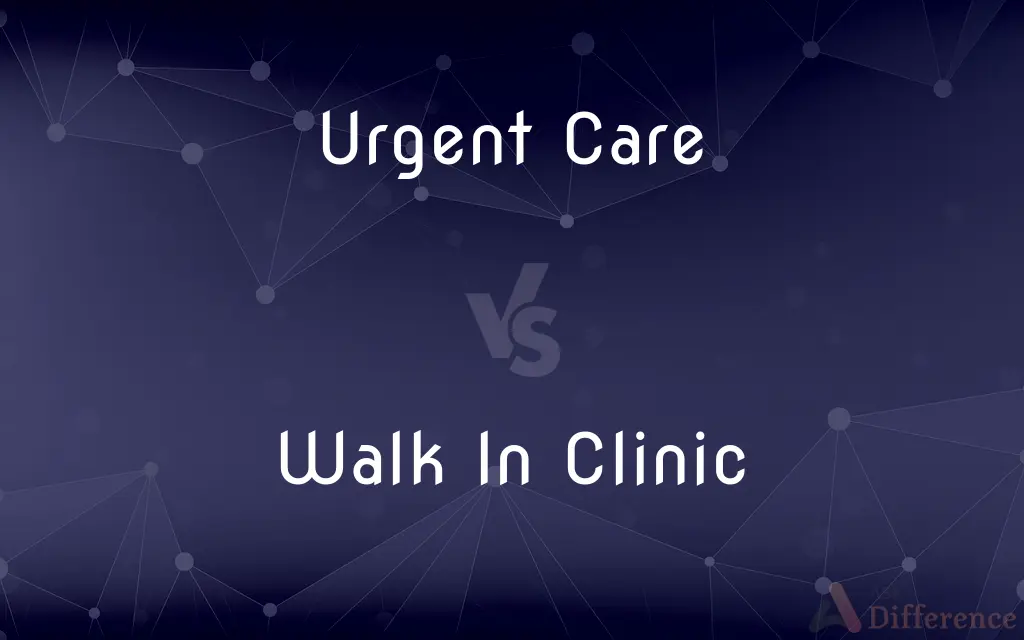Urgent Care vs. Walk In Clinic — What's the Difference?
By Maham Liaqat & Urooj Arif — Published on November 11, 2024
Urgent Care centers provide immediate, non-emergency medical services for acute illnesses or injuries, with broader services than Walk-In Clinics, which offer basic medical care for minor conditions without an appointment.

Difference Between Urgent Care and Walk In Clinic
Table of Contents
ADVERTISEMENT
Key Differences
Urgent Care centers are equipped to handle a wide range of medical issues that, while not life-threatening, require prompt attention. These include fractures, moderate cuts requiring stitches, and severe respiratory illnesses. Walk-In Clinics, on the other hand, primarily focus on providing quick consultations for minor health concerns like colds, minor cuts, and vaccinations, emphasizing convenience and accessibility.
Both facilities offer care without the need for an appointment, but Urgent Care centers typically have more advanced medical equipment and a broader scope of services. They often have on-site X-rays, lab services, and can administer IV fluids, which are not usually available at Walk-In Clinics. This makes Urgent Care a more suitable option for slightly more serious conditions that don't require an emergency room visit.
Urgent Care centers are usually staffed by a team that includes physicians, nurse practitioners, and physician assistants, allowing them to offer a wider range of treatments. Walk-In Clinics, however, may primarily be staffed by nurse practitioners or physician assistants, focusing on efficiency and basic medical care.
The cost of services at Urgent Care centers is generally higher than at Walk-In Clinics due to the more extensive care and procedures they provide. However, both options are less expensive than visiting an emergency room for non-life-threatening issues. Patients choose between them based on the severity of their condition and the level of care required.
Finally, the operating hours of Urgent Care centers often extend beyond normal business hours, including evenings and weekends, providing a middle ground between primary care offices and emergency rooms. Walk-In Clinics might have more limited hours and are frequently located within retail or pharmacy settings, making them more accessible for everyday health concerns.
ADVERTISEMENT
Comparison Chart
Services
Broad medical care for acute illnesses/injuries
Basic medical care for minor conditions
Equipment
Advanced (X-rays, labs, IVs)
Basic or limited
Staff
Physicians, nurse practitioners, physician assistants
Primarily nurse practitioners, physician assistants
Cost
Higher due to extensive services
Lower, more affordable for basic care
Operating Hours
Extended hours, including weekends
Regular or limited hours, varies by location
Compare with Definitions
Urgent Care
Typically staffed by a diverse medical team.
The physician at Urgent Care diagnosed her with pneumonia.
Walk In Clinic
Often staffed by nurse practitioners or physician assistants.
The nurse practitioner at the Walk-In Clinic treated his minor burn.
Urgent Care
Available outside of typical office hours.
They went to Urgent Care on Sunday when their doctor's office was closed.
Walk In Clinic
More affordable option for basic healthcare needs.
Their visit to the Walk-In Clinic for cold symptoms was relatively inexpensive.
Urgent Care
Generally more expensive than Walk-In Clinics.
His visit to Urgent Care for IV hydration cost more than expected.
Walk In Clinic
Focuses on efficiency and accessibility.
She chose the Walk-In Clinic for a quick prescription refill.
Urgent Care
Offers more comprehensive services than Walk-In Clinics.
Urgent Care provided the necessary X-ray for his sprained ankle.
Walk In Clinic
Provides convenient care for minor medical issues.
He got his flu shot at a Walk-In Clinic inside the pharmacy.
Urgent Care
A facility for acute illnesses or injuries requiring immediate care.
She visited Urgent Care for stitches after a minor accident.
Walk In Clinic
May have more limited services and equipment.
The Walk-In Clinic referred her to Urgent Care for an X-ray.
Common Curiosities
Do I need an appointment for a Walk-In Clinic?
No, Walk-In Clinics operate on a first-come, first-served basis, requiring no appointment.
Are Urgent Care centers more expensive than hospitals?
Urgent Care centers are generally less expensive than hospital emergency rooms for non-emergency care.
Can I go to Urgent Care for any medical emergency?
No, Urgent Care is for non-life-threatening emergencies. Life-threatening conditions require an ER visit.
Can Walk-In Clinics provide vaccinations?
Yes, many Walk-In Clinics offer vaccinations as part of their routine services.
How do I choose between Urgent Care and a Walk-In Clinic?
Choose based on the severity of your condition; use Urgent Care for more serious issues that don't warrant an ER visit and Walk-In Clinics for minor ailments.
Can Walk-In Clinics manage chronic conditions?
Walk-In Clinics are generally not designed for managing chronic conditions, focusing instead on minor, acute health issues.
Are the doctors at Urgent Care qualified?
Yes, Urgent Care centers are staffed by qualified healthcare professionals, including doctors.
Do Urgent Care centers accept insurance?
Most Urgent Care centers accept a variety of insurance plans, but it's best to check in advance.
Are Walk-In Clinics suitable for children?
Yes, Walk-In Clinics can treat children for minor illnesses or injuries, but always consider the level of care needed.
Do Walk-In Clinics have X-ray machines?
Most Walk-In Clinics do not have X-ray facilities; this service is more common in Urgent Care centers.
Is Urgent Care faster than an ER?
For non-life-threatening conditions, Urgent Care is often faster and more efficient than an ER visit.
What if my condition worsens at a Walk-In Clinic?
If your condition is more serious than initially assessed, a Walk-In Clinic will refer you to Urgent Care or an ER.
Can I get a prescription from Urgent Care?
Yes, Urgent Care centers can prescribe medications as part of your treatment.
Can I use Urgent Care as my primary healthcare provider?
Urgent Care is not intended to replace a primary care provider but is a resource for immediate care when your provider is unavailable.
How late are Urgent Care centers open?
Many Urgent Care centers are open late, often until 8 or 9 PM, and some even operate 24/7.
Share Your Discovery

Previous Comparison
Charcoal vs. Activated Charcoal
Next Comparison
Deforestation vs. LoggingAuthor Spotlight
Written by
Maham LiaqatCo-written by
Urooj ArifUrooj is a skilled content writer at Ask Difference, known for her exceptional ability to simplify complex topics into engaging and informative content. With a passion for research and a flair for clear, concise writing, she consistently delivers articles that resonate with our diverse audience.










































